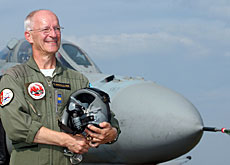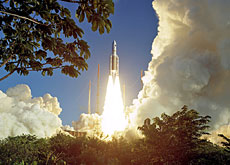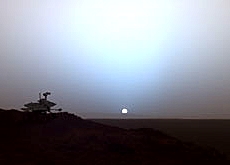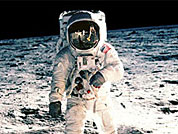Space is for everyone, astronaut says

Retired Swiss astronaut Claude Nicollier tells swissinfo space travel is a life-enhancing experience and should be open to non-professionals.
In a wide-ranging interview, Nicollier also expresses confidence that Europe’s satellite navigation system, Galileo, will go ahead despite funding and scheduling problems.
Switzerland has contributed around €30 million (SFr49.5 million) and a Swiss company is providing atomic clocks for the project that will rival the US-run Global Positioning System (GPS).
The launch date for the first of the planned 30 satellites has been pushed back from 2008 to 2011 at the earliest after a funding dispute between European Union governments.
Nicollier, who retired from the European Space Agency in March, says he believes Switzerland will continue to punch above its weight in the ESA, thanks to the country’s tradition of precision engineering.
swissinfo: What do you feel about rich individuals paying to go into space?
Claude Nicollier: I try to avoid the term space tourism – ‘space for everyone’ is the term I would rather use. People are willing to pay a lot of money to experience that very special feeling of weightlessness and a very unique view of the Earth from space. It is very popular, it is going to grow, and of course, if there is money to be made it will be made.
In aviation you have professionals who fly and crew the plane and you have passengers who can enjoy going from A to B relatively quickly and with a beautiful view out of the window.
The problem that might occur is that some may compare themselves to astronauts who have spent many years training. But I don’t see why professional astronauts should be bothered by non-professionals going into space to enjoy the view.
Sharing this deep experience and increasing people’s awareness of our planet can only be positive.
swissinfo: The Galileo project has run into severe difficulties recently. Is it in danger of collapsing?
C.N.: It has always been a difficult project mainly because each big country [European countries involved in the project] now wants a bigger part than was originally envisioned.
There is turbulence around the path but it is going to happen. It is too important for Europe to have its own autonomous capabilities for precise navigation for this programme to be abandoned.
swissinfo: What will be Switzerland’s future role in space programmes?
C.N.: Switzerland is a small country but it is a very respected member of the European Space Agency – in fact it was one of the founder members.
It is respected because the craftsmanship produced in various companies is recognised as high quality. It is well known that Swiss watchmakers cannot produce bad mechanical and electrical devices for space ships.
swissinfo: If you were still active as an astronaut what missions would you most like to be involved in?
C.N.: Any human space flight that is related to research that I hold in affection, like astronomy. There is another mission to Hubble [the space telescope] at the end of next year that I would have loved to be part of because I have a lot of respect and devotion to the telescope that has been enriching our knowledge of the universe.
Beyond that I would gladly take a flight to the Moon or Mars. To walk on another celestial body is certainly a dream of every astronaut – but that is not going to happen.
swissinfo-interview: Matthew Allen in Zurich
Born in 1944, Nicollier received a Masters in astrophysics from Geneva University in 1975.
He began his career as a pilot in the Swiss Air force in 1966, reaching test pilot status in 1988. He also worked for the former national carrier, Swissair, in the 1970s.
He joined the European Space Agency in 1976, before being chosen as one of its first astronauts in 1978. He was detached to the American space programme in 1980, joining Nasa’s team of future space shuttle specialists.
He later took part in four shuttle flights, logging more than 1,000 hours in space. He flew as a mission specialist in 1992, 1993, 1996 and 1999.
During his last mission, he took part in repairing the Hubble space telescope, spending over eight hours walking in space.
Galileo is Europe’s biggest space project to date, costing €3.8 billion (SFr 6.2 billion) of taxpayers’ money and private finance.
A test spacecraft launched into space in December 2005. But the launch date for the first of the planned 30 satellites has been pushed back from 2008 to 2011 at the earliest after a funding dispute between European Union governments.
EU transport ministers are expected to agree at a meeting in Luxembourg on Friday to call off stalled negotiations with the private consortium of eight companies charged with running the project and decide that all of the financing should come from public sources.
Galileo is a civilian project aimed at providing an accurate navigation system for cars, trains, aircraft and other transport.

In compliance with the JTI standards
More: SWI swissinfo.ch certified by the Journalism Trust Initiative




You can find an overview of ongoing debates with our journalists here. Please join us!
If you want to start a conversation about a topic raised in this article or want to report factual errors, email us at english@swissinfo.ch.